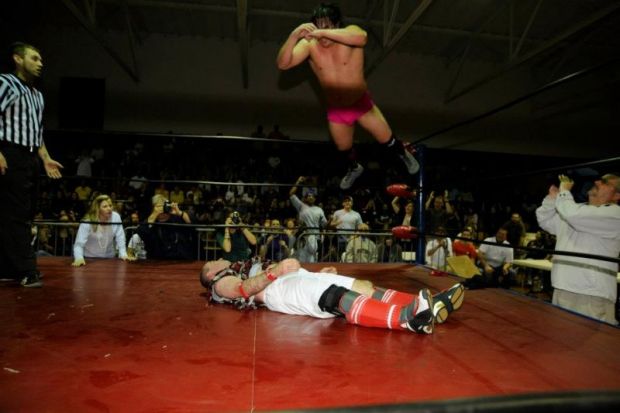It’s not unusual for academics to go the extra mile for their teaching.
Some would argue that it is part of the job these days, with lecturers often using weekends and evenings to mark essay scripts or prepare classes.
Few scholars, however, volunteer to be beaten up publicly in the name of education. But that is exactly what Dan Mathewson has done in recent years in his role as the wrestler Mr Canada, who has starred in several student tag-team matchups at his institution, Wofford College, a private liberal arts college in South Carolina.
Dr Mathewson told me that he had decided to participate in the bouts after creating an experimental programme in which he asked students to train as wrestlers, create their own characters and then stage their own “January Smackdown” on campus.
Having run the course in association with a local independent wresting company for several years, the 45-year-old academic realised he needed to get involved if he wanted to teach the course effectively, despite being a few decades older than his student opponents.
Some of his fights are online, and it’s also clear that Dr Mathewson is quite a bit smaller than the bulkier, more athletic students competitors. You won’t see him flying off the top turnbuckle or body slamming opponents in the manner of the muscle-bound warriors seen in World Wrestling Entertainment.
His main reason for being in the contests is largely, it seems, to be knocked around. In one bout, a female student slams his face into a metal crowd barrier (in the sport’s typically stylised way that avoids actual injury). He has also been hit by a metal chair and seen a student leap from height onto his prone body (again, all highly choreographed).
He also does a good line in baiting the patriotic, Southern crowd. For instance, he often lauds the youthful Canadian prime minister Justin Trudeau and the superiority of all things Canadian. Spectators then delight in the puny maple-leafer taking a pasting from his all-American competitors. (Wofford’s students seem well aware of the joke, I should add).
At a certain level, Dr Mathewson obviously enjoys entering this strange world, which he describes as “poor white Southern theatre”. Here, blue collar spectators see a recognisable version of the lives acted out as fighters tap into various fears, prejudices (often xenophobic) and aspirations.
Heroic comebacks, unlikely against-the-odds victories and odious villains getting their comeuppance are all part of the sport’s enduring appeal, despite its obvious artifice. Donald Trump’s frequent character reinventions over the years have echoes in the sport, where villains can become heroes and vice versa, Dr Mathewson argues, making it more important than ever to “unpack” the genre, he says.
Dr Mathewson’s willingness to immerse himself fully in this world – risking injury, mockery and the disapproval of his concerned wife (who wants him to call time on his career) – may seem bizarre to some readers. But it will also make sense to many academics who recognise his ring exploits as part of a wider duty to serve students and scholarship.
The same commitment that leads researchers from Oxford and Lancaster universities to head into the burning Amazon to examine rainforest resilience, despite the risks of snakes, bandits and respiratory conditions – as detailed in this week’s Outer Limits feature, our regular examination of extreme and often dangerous research projects.
This willingness to push the boundaries in the name of scholarship and truth is also why Victoria Bateman – the Cambridge economist and Times Higher Education contributor – appeared naked on breakfast TV this week to warn about the dangers of Brexit.
To all those putting themselves in unusual and often perilous situations in the interests of knowledge, truth and education, I salute you.
Jack Grove is a reporter and deputy features editor at Times Higher Education.
Register to continue
Why register?
- Registration is free and only takes a moment
- Once registered, you can read 3 articles a month
- Sign up for our newsletter
Subscribe
Or subscribe for unlimited access to:
- Unlimited access to news, views, insights & reviews
- Digital editions
- Digital access to THE’s university and college rankings analysis
Already registered or a current subscriber? Login







